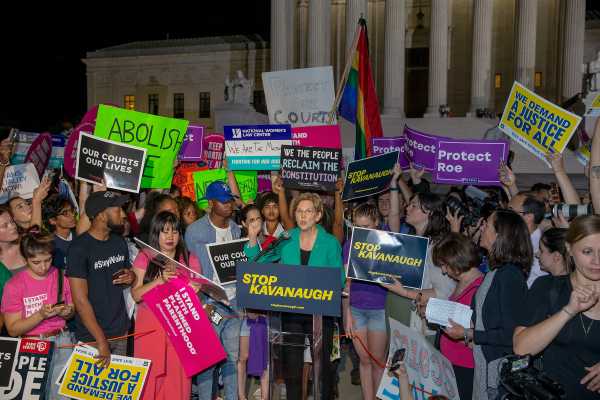
Activists are making a big bet on President Donald Trump’s nomination of Judge Brett Kavanaugh to replace retiring Justice Anthony Kennedy on the Supreme Court — that they can replicate the success of killing Obamacare repeal by focusing on protecting the right to an abortion and a new lawsuit that could severely weaken the Affordable Care Act.
Their path to victory is just as narrow as it was during the health care vote, but many of the same key players are involved.
In particular, activists plan to lobby moderate Republican Sens. Susan Collins of Maine and Lisa Murkowski of Alaska, both of whom are pro-abortion rights and who were two of the Republican swing votes on Obamacare repeal. Activists are already planning protests, office visits, and letters to the editor to try to sway each of them.
The center of their focus is a new threat to undermine the ACA: a lawsuit arguing preexisting condition bans should be unconstitutional. The lawsuit, which Vox’s Dylan Scott reported on last month, was initially brought by conservative states. But the Trump administration recently signed on in another push to destroy Obamacare.
“If the Trump administration’s argument were to prevail, insurers could once again be able to flat-out deny Americans insurance based on their health status,” Scott wrote.
The Supreme Court has twice affirmed the legality of the Affordable Care Act. But this latest effort by the Trump administration makes it clear these lawsuits are not going away anytime soon.
Activists have a hard enough time getting all of the Senate Democrats to band together to oppose Trump’s nomination, but even if they manage to, it won’t matter. Republicans only need 50 votes to confirm Kavanaugh. And just as with the health care vote, activists need to lobby moderate Republicans, trying to appeal to them on issues including health care and abortion rights.
These are two of the most pressing issues for progressive activists, who fear a Trump Supreme Court pick could eventually vote to overturn the landmark 1973 abortion decision Roe v. Wade or do serious damage to the Affordable Care Act.
Activists have a two-pronged strategy: First, get senators to oppose the nomination, and second, flip the Senate in the November midterms.
Both will be tall orders, but they say energy is on their side.
“People understand that what’s at stake is the fate of choice, the fate of health care,” said Elizabeth Beavers, associate policy director for national activist group Indivisible.
Activists are already mobilizing on Trump’s Supreme Court pick
Activists around the country have already launched a week of action in response to Trump’s announcement, and plan to keep up the pressure from now until whenever the confirmation hearings and votes take place.
Even though some have suggested Senate Democrats should attempt to obstruct the new nominee, they have no tools in their toolbox to do so. After Democrats attempted to filibuster the Neil Gorsuch nomination, McConnell blew up the process and got rid of the filibuster on Supreme Court nominees. (Democrats did something similar for lower court nominees when they were in power.)
Some activists are under no impression that Democrats will be able to delay until after the midterms.
“We think it’s important to recognize those are fairy tale possibilities,” Beavers said. “We don’t have any power to do those things. Our only way to win is on the floor.”
With Murkowski and Collins viewed as the key swing votes, there are already numerous protests and actions being planned in the senators’ home states of Maine and Alaska. In Maine, activists are busy organizing drop-ins to Collins’s office and drafting letters to the editor. They are also considering appealing to former moderate Republican Sen. Olympia Snowe to pressure Collins to vote no.
“We are a small state with a limited amount of people who can mobilize and one of the most important senators in the country when it comes to the vote,” said Marie Follaytarr Smith, director of activist group Mainers for Accountable Leadership.
But Smith, who has met with Collins on multiple occasions related to health care and taxes, isn’t convinced the senator will listen to activists.
“I do not think she is listening,” she said. “I hope her past support for Roe v. Wade will impact her decision making.”
Activists are also not letting up on Senate Democratic leadership, demanding Senate Minority Leader Chuck Schumer keep his caucus in line and unified in a vote against Trump’s nominee. This could be tough, given three red-state Democrats who are facing tough reelections already voted for Gorsuch.
“I think we want to see Democrats fight,” Beavers said. “We want to see Democrats win and we want to see them being effective in pursuing aggressive change. It takes bold steps to do that.”
This is the biggest Supreme Court fight in a generation
Activists have had mixed success lobbying Congress under Trump. They were effective during the health care fight, but less so with the sweeping tax cuts Republicans were able to pass late last year, in part because the massive bill was chock full of competing issues. Progressive groups also haven’t made much headway convincing lawmakers to pass an immigration bill.
“We don’t have to do a lot of explaining on this one. People understand the impact of Supreme Court decisions; we’ve had a lot of them in the past few years that have meant a lot,” said Beavers.
There’s no such ambiguity with Trump’s Supreme Court pick: The stakes are clear. Health care is a huge piece of what liberal activists are concerned about when it comes to the Supreme Court. (The Court has twice weighed in on challenges to the Affordable Care Act, siding with the Obama administration and keeping the law intact.)
But even more concerning to many activists and women around the country is what another Supreme Court justice could do to the abortion ruling Roe v. Wade, which made abortion legal around the United States. Plenty are worrying that having enough conservative justices on the Court could reverse the ruling in the future.
“The right to access safe and legal abortion is on the line,” said Kelley Robinson, national organizing director for Planned Parenthood Federation of America.
Robinson said she knows the battle to get to 51 no votes on Kavanaugh will be difficult, but the wave of activism since Trump was elected and past success on health care has made her hopeful that the Supreme Court fight can be won.
“When people make their voices heard, our representatives act in our interest,” she said. “I’m confident when we’re able to organize and mobilize. The stakes are too high for anyone to stay at home, and too high for us to take things for granted.”
SCOTUS makes the midterms even more crucial for Democrats
If there’s one lesson Democrats can absorb from their current situation, it is that elections matter. The 2014 midterm elections saw some of the lowest voter turnout in 72 years: 36.3 percent.
There may not have been much Supreme Court drama happening in 2014, but as Vox’s Ezra Klein laid out in a recent piece, the lack of enthusiasm then had a huge impact on what is happening with the Court now.
Of course, there was a Democratic president when Justice Antonin Scalia died, but Senate Republicans, led by Mitch McConnell, wouldn’t even let Barack Obama nominee Merrick Garland have a confirmation hearing, much less a vote.
That tactic paid off for McConnell, with Gorsuch’s confirmation followed by Trump’s new nominee to replace the retiring Kennedy. Democrats are vowing not to make the same mistake in the future, but their first test is whether they can turn out to the 2018 midterms in droves. The hope is that Democrats can flip the House, but activists really want them to flip the Senate, too.
“We don’t have agenda-setting power as long as we don’t control the legislature,” said Beavers. “It’s a really natural connection between emphasizing the activism around the Supreme Court on why elections matter. I definitely think that throughout the country, the energy is there. People are scared, but they’re also motivated.”
Sourse: vox.com






